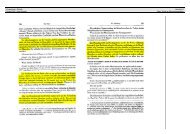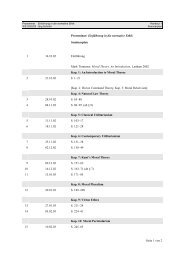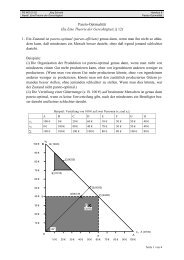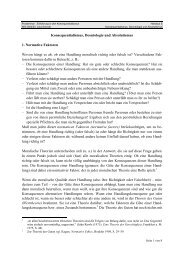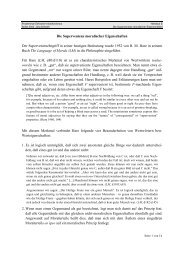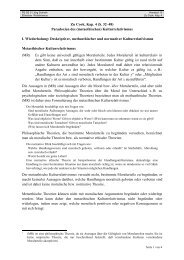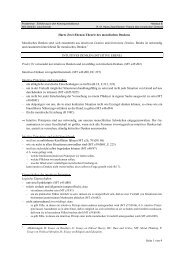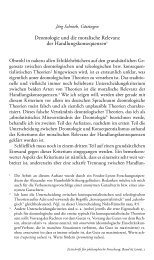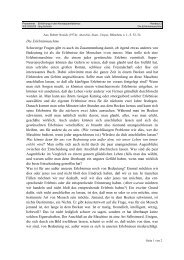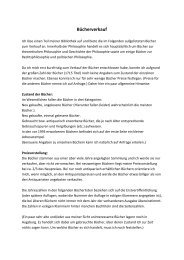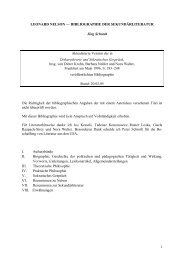Adäquatheitskriterien für moralische Theorien - Jörg Schroth
Adäquatheitskriterien für moralische Theorien - Jörg Schroth
Adäquatheitskriterien für moralische Theorien - Jörg Schroth
Create successful ePaper yourself
Turn your PDF publications into a flip-book with our unique Google optimized e-Paper software.
Proseminar Einführung in die normative Ethik Handout 3<br />
WS 2002/03 <strong>Jörg</strong> <strong>Schroth</strong> <strong>Adäquatheitskriterien</strong> <strong>moralische</strong>r <strong>Theorien</strong><br />
(4) Moral theories should identify afundamental principle that both (a) explains<br />
why our more specific considered moral convictions are correct and (b)<br />
justifies them from an impartial point of view.<br />
(5) Moral theories should help us deal with moral questions about which we are<br />
not confident, or do not agree. (Brad Hooker, Ideal Code, Real World, Oxford<br />
2001, S. 4)<br />
Tom L. Beauchamp/James F. Childress (1994)<br />
Awell-developed ethical theory provides aframework within which agents can reflect<br />
on the acceptability of actions and can evaluate moral judgments and moral character.<br />
[...]<br />
Criteria for Theory Construction<br />
We begin with eight conditions of adequacy for an ethical theory. These proposals for<br />
theory construction set forth exemplary conditions for theories, but not so exemplary<br />
that atheory could not satisfy them. That all available theories only partially satisfy the<br />
demands in these conditions is not of concern here. The objective is to provide abasis<br />
from which to assess the defects and the strengths of theories. Satisfaction of these<br />
conditions protects a theory from criticism as a mere list of disconnected norms<br />
generated from our pretheoretic beliefs. The same general criteria of success in amoral<br />
theory can be used for any type of theory (for example, ascientific theory or apolitical<br />
theory). The eight conditions that follow express these criteria.<br />
1. Clarity. First, atheory should be as clear as possible, as awhole and in its parts.<br />
Although we can expect only as much precision of language as is appropriate, more<br />
obscurity and vagueness exists in the literature of ethical theory and biomedical ethics<br />
than is necessary or justified by the subject matter.<br />
2. Coherence. Second, an ethical theory should be internally coherent. There should be<br />
neither conceptual inconsistencies (for example, “strong medical paternalism is justified<br />
only by consent of the patient”) nor contradictory statements (for example, “to be<br />
virtuous is amoral obligation, but virtuous conduct is not obligatory”). [...] However,<br />
consistency is not asufficient condition of agood theory, only anecessary condition. If<br />
an account has implications that are incoherent with other established parts of the<br />
account, some aspect of the theory needs to be changed in away that does not produce<br />
further incoherence. [...]<br />
3. Completeness and Comprehensiveness. A theory should be as complete and<br />
comprehensive as possible. Atheory would be entirely comprehensive if it included all<br />
moral values. Any theory that includes fewer moral values will be somewhere on a<br />
continuum from partially complete to void of important values. [...]<br />
Seite 2 von 4



